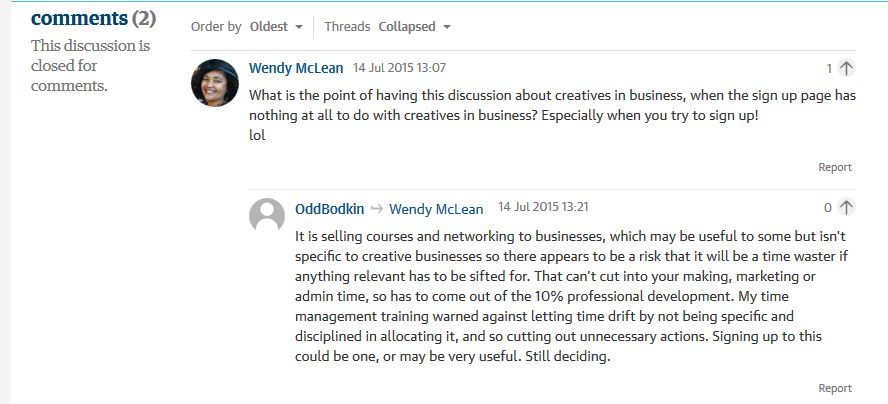A week ago I wrapped up my final post about the arts entrepreneurship training programs being developed in colleges and universities by pointing out that there was still the unmet need of artists who had already embarked on their careers.
I think the challenge faced by artists is summed up pretty well in the comments section of an article in The Guardian titled “Creating wealth: how artists can become inventive entrepreneurs”
Here is screenshot of the comments:
While there is a constant refrain that artists and arts organizations need to handle themselves in a more business-like manner, there aren’t a lot of sources of information and training that is tailored to the needs of creatives.
Wendy McLean’s comment is a reaction to the fact the story was framed as coming from members of the Guardian’s Small Business Network group, but when she went to sign up, the questions asked gave the impression it wasn’t really suited to her at all.
As the second commenter OddBodkin points out, any time you spend trying to distill lessons from generic information sources in order to discern what might be applicable to your situation, that is time you aren’t spending on your core creative focus.
It can be difficult to create a training program that is suited to artists. A regular schedule of classes may not work well for people with varying rehearsal and performance commitments that have them traveling all over a region or for artists who get so focused on creating they don’t look up until 11:00 pm.
Online resources that one can consult at their own pace can be very helpful, but guidance and clarification from a live person is just as valuable. Networks of colleagues can solve this problem, but frequently you simply don’t know what you don’t know.
I don’t have any clear cut solutions to suggest. You know I will share them when I find them.
There are good resources like Fractured Atlas that are revved and ready to help creative folks develop their careers.
I also want to put a plug in for ArtsHacker. (As you may know I am a contributor there.) While the site offers tips generated by the writers, it also solicits questions and problems readers for which readers would like solutions.
When the site opened about 11 months ago, I thought we would be fielding bunches of questions before long but there haven’t been too many. I know you all have burning questions you want answered, so get asking!




There is another way. The Gewandhaus Leipzig in Germany (concert venue) offers flex- tickets for a small premium. Not an…